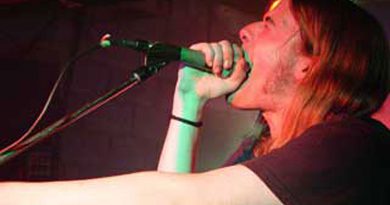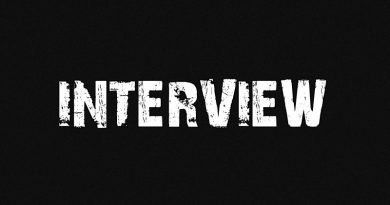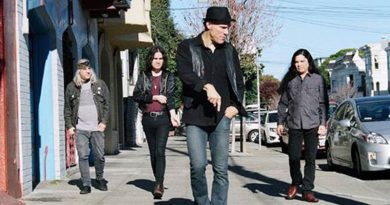Wrekmeister Harmonies: Will Beatie Interviews JR Robinson
Often bleak, always beautiful, and perversely elevating, Night Of Your Ascension is the latest release by Wrekmeister Harmonies. If you’re looking for upbeat fun, you’ve come to the wrong place. Marrying serialism, drone, doom and ambience, Night Of Your Ascension is an exploration of the darkness pervading human existence. It meditates on the stories of composer Don Carlo Gesualdo and paedophilic priest Father John Geoghan, men guilty of terrible crimes. Its morbid fascination with cruelty reflects upon our own sensational interest in the abhorrent.
Given this appeal to universal human sensibilities (we’re all pretty screwed up individuals, it turns out), it should be no surprise that Night Of Your Ascension has been making the rounds on plenty of Best of 2015 lists. We got in touch with main man JR Robinson to talk about the men that inspired the album, the values of organised religion, and why deciding to work with thirty musicians is a sign of mental instability.
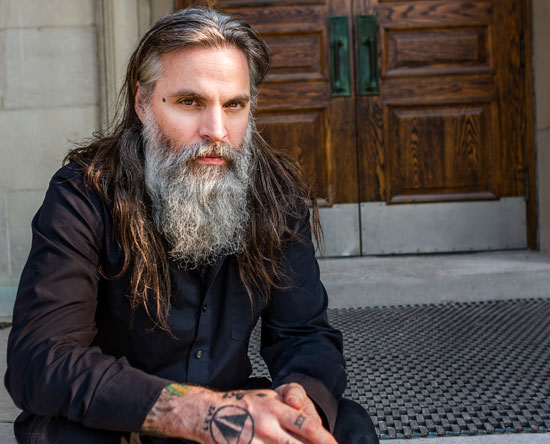
To begin, what is the most starkly different thing about this album to other Wrekmeister Harmonies releases?
I would say the number of artists involved and that there are two pieces that tie together a cohesive narrative.
What drew you to serialism on this and other Wrekmeister Harmonies releases? How do you feel that the subject matter and serialist style lend themselves to each other on Night Of Your Ascension?
I was drawn to the idea that there were two different individuals on opposite ends of an actual timeline that committed horrific acts and were seeking to either redeem themselves through religion or were sanctioned by a religious organization for their heinous acts. The question of what was the greater horror, the grotesque nature of the acts or the moral horror of those acts going unpunished and to a greater extent, in Geoghans case, the actual concealment by church leaders.
On Night Of Your Ascension you deal primarily with the cases of disgraced priest Father John Geoghan and the composer Don Carlo Gesualdo. Did the general concept behind the album lead you to these particular cases, or vice versa?
I was researching both individuals simultaneously, but for different reasons. In Gesualdo’s case I came across a piece by Alex Ross titled Prince Of Darkness that chronicled not only his crimes but also his unique (and of that period of time) unheard of tonal structures for composing. I was fascinated by his madrigals by both his use of this seemingly clashing and abrasive tone structure and that most of these madrigals were written from the perspective of self loathing and misguided justification for the murder of his one true love. Father John Geoghan’s case came from a Boston Globe series that I was engrossed with reading. I grew up in the Boston area and had many interactions with the Catholic Church as a young person of a single mother.
Moving away from the two specific examples of Father Geoghan and Don Carlo Gesualdo, were you thinking about any other events or individuals when writing the album?
No, I was pretty fixated on developing the narrative for both pieces. For Night Of Your Ascension I chose to represent the peaceful and beautiful part of Gesualdo’s life with the opening section, Marrisa Nadler’s vocal work on that was incredible in representing it. The middle section was a reworking of Gesualdo’s madrigal Ahi Dispietata e Cruda. I had the original score and had the string section leader Fred Lonberg-Holm do an improvisational take on it and then had the rest of the string section record over that. The choir section was handled in basically the same way. For the end I wanted to introduce the theme of suspicion which leads to an ultimate act of violence. For Run Priest Run I wanted to convey the idea of being incarcerated in a very cold, harshly lit environment. An environment where one is taunted, harassed and frightened at almost every waking moment, leading to an act of terrible violence that is in fact, predestined.
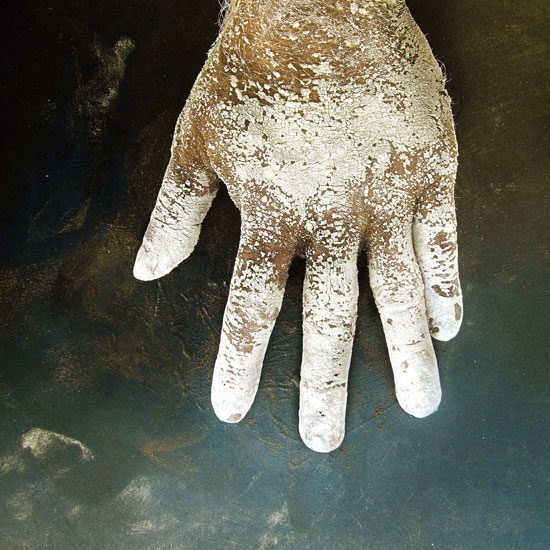
You have identified organised religion as a major thread that ties these two figures together. What place do you believe organised religion has in the context of a commentary on human morbidity?
I believe that organized religion is a great lie and has caused both overt violence and undue suffering on mankind. From what I can see there is very little solace or peace being offered by any organized religion. In the case of Christianity one could counter that with “well, isn’t there something valuable in offering comfort to a lonely old lady?” and I would say that isn’t there something equally valuable about the comfort a small child gets when offered presents by a fictitious character in December? Religion is really nothing more than a misguided effort by humans to attempt to understand a universe that is beyond our comprehension, all celebrating their various uniqueness’ of being “chosen” and in possession of an absolute truth. Aside from some really great rituals, outfits and interesting stories, the main outcome has been to inflict unnecessary pain and suffering on a grand scale to those who do not agree. The only truth any reasonable person can deduce from this criteria is that there is no God.
Night Of Your Ascension features an impressive cast of 30 musicians, but what drew you to work with them on this recording and have you worked alongside any of them previously?
I temporarily lost my mind and thought that working with this many people would be a good idea. I had worked with the guys from Bloodiest and Indian on Then It All Came Down but a lot of the people I asked I haven’t had the pleasure of working with before. I knew I wanted to have Marrisa Nadler sing on it. I love the guys from The Body and thought it would really awesome to have Alexander Hacke collaborate with them. I think Cooper from Cave is such an amazing musician and he understood completely what I was trying to do.
How much creative control is given to the guest musicians who play on the album? Do they stick close to the script, as it were, or does improvisation play a part in the finished article?
Generally I have a few things written down or recorded already and then we build upon those. The idea of inviting other artists is to not try and control them too much. I pass along some background information or play something for them and it usually ends up working well.
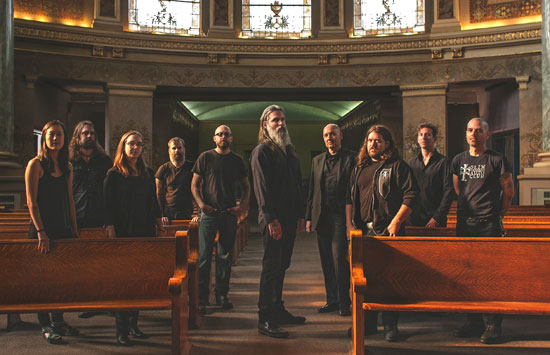
Does the live show play a role in writing a Wrekmeister Harmonies album? In the past you have selected interesting and atmospheric venues, like Bohemian National Cemetery, to complement the music. Is the location something you have ever considered during the writing process?
I had a thing where at one time I only was going to play in interesting or unique venues. I was able to do that to a certain extent but the reality of the situation is you’ll end up not playing anywhere except for maybe twice in a year. Which isn’t a bad thing, it’s just not terribly productive for presenting the work. The only location I consider during the writing process is my own head, the constant internal dialogue of processing the parts and the shaping of the piece.
Do your albums tie together in any particular thematic way? Should the listener be as conscious of the Wrekmeister Harmonies discography as the message in Night Of Your Ascension specifically?
Not really. I read a lot, watch film, observe people wherever I’m at, try and listen to as much music as I can. I just read this book on the history of the CIA in Afghanistan, it was pretty great but not inspiring any great theme for me to construct something. I feel like each of the releases have had their own individual messages that open out into a more comprehensive principle. You’ve Always Meant So Much To Me was specifically about the loss of one individual which opened out into theme of how absolutely nothing lasts forever, the universe is in a constant cycle of destruction and rebirth. Then It All Came Down was about Bobby Beausoleil which further introduced the idea of darkness that hides in light, things are never what they seem. Night Of Your Ascension is about Gesualdo and Geoghan but introduces the idea of reconciling the specific horror of their acts with the moral horror of passivity by organized religion.
The album art for this release is bleak, to say the least. Can you explain anything behind the artwork, its source, or your impressions of it?
For no particular reason I got really interested in looking at hands for a little while. I would stare at people’s hands all the time no matter where I was. And then I really wanted to try and use a hand as a piece of sculpture. I talked it over with David Yow and he sent me about 400 photos of his hand in different arrangements. I was totally impressed. Some were plain and clean, others had dirt and bits of what looked like motor oil, others had white powder. So I chose the one hand posture I liked the most, and we worked on covering it with mainly powder with just a bit of grease and dirt.
Night Of Your Ascension is out now on Thrill Jockey Records and you can read Will’s review here.
Band Links: Official | Facebook | Bandcamp | Twitter
Interviewed by: Will Beattie
Photo Credit: Katie Hovland

